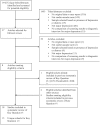Does evidence support the American Heart Association's recommendation to screen patients for depression in cardiovascular care? An updated systematic review
- PMID: 23308116
- PMCID: PMC3538724
- DOI: 10.1371/journal.pone.0052654
Does evidence support the American Heart Association's recommendation to screen patients for depression in cardiovascular care? An updated systematic review
Abstract
Objectives: To systematically review evidence on depression screening in coronary heart disease (CHD) by assessing the (1) accuracy of screening tools; (2) effectiveness of treatment; and (3) effect of screening on depression outcomes.
Background: A 2008 American Heart Association (AHA) Science Advisory recommended routine depression screening in CHD.
Methods: CINAHL, Cochrane, EMBASE, ISI, MEDLINE, PsycINFO and SCOPUS databases searched through December 2, 2011; manual journal searches; reference lists; citation tracking; trial registries. Included articles (1) compared a depression screening instrument to a depression diagnosis; (2) compared depression treatment to placebo or usual care in a randomized controlled trial (RCT); or (3) assessed the effect of screening on depression outcomes in a RCT.
Results: There were few examples of screening tools with good sensitivity and specificity using a priori-defined cutoffs in more than one patient sample among 15 screening accuracy studies. Depression treatment with antidepressants or psychotherapy generated modest symptom reductions among post-myocardial infarction (post-MI) and stable CHD patients (N = 6; effect size = 0.20-0.38), but antidepressants did not improve symptoms more than placebo in 2 heart failure (HF) trials. Depression treatment did not improve cardiac outcomes. No RCTs investigated the effects of screening on depression outcomes.
Conclusions: There is evidence that treatment of depression results in modest improvement in depressive symptoms in post-MI and stable CHD patients, although not in HF patients. There is still no evidence that routine screening for depression improves depression or cardiac outcomes. The AHA Science Advisory on depression screening should be revised to reflect this lack of evidence.
Conflict of interest statement
Figures




References
-
- Meijer A, Conradi HJ, Bos EH, Thombs BD, van Melle JP, et al. (2011) Prognostic association of depression following myocardial infarction with mortality and cardiovascular events: A meta-analysis of 25 years of research. Gen Hosp Psychiatry 33 3: 203–216. - PubMed
-
- Lichtman JH, Bigger JT Jr, Blumenthal JA, Frasure-Smith N, Kaufmann PG, et al. (2008) Depression and coronary heart disease: Recommendations for screening, referral, and treatment: A science advisory from the American Heart Association Prevention Committee of the Council on Cardiovascular Nursing, Council on Clinical Cardiology, Council on Epidemiology and Prevention, and Interdisciplinary Council on Quality of Care and Outcomes Research: Circulation. 118 17: 1768–1775. - PubMed
-
- Wilson JM, Jungner G (1968) Principles and practices of screening for disease. Geneva: World Health Organization.
-
- Thombs BD, de Jonge P, Coyne JC, Whooley MA, Frasure-Smith N, et al. (2008) Depression screening and patient outcomes in cardiovascular care: A systematic review. JAMA 300 18: 2161–2171. - PubMed
Publication types
MeSH terms
Substances
Grants and funding
LinkOut - more resources
Full Text Sources
Other Literature Sources
Medical
Research Materials
Miscellaneous

